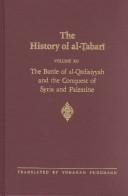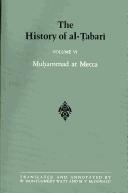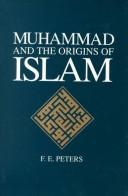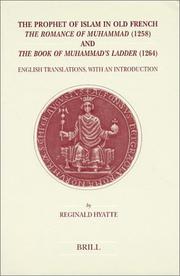| Listing 1 - 10 of 27 | << page >> |
Sort by
|
Book
ISBN: 9780521886079 9780521713726 0521713722 0521886074 9780511781551 Year: 2010 Volume: *13 Publisher: Cambridge Cambridge University Press
Abstract | Keywords | Export | Availability | Bookmark
 Loading...
Loading...Choose an application
- Reference Manager
- EndNote
- RefWorks (Direct export to RefWorks)
Muhammad, --- 297.167 --- Islam: stichter: Mohammed --- Mahomed, --- Maḥmūd, --- Mahomet, --- Mohammed, --- Magomet, --- Mu-han-mo-te, --- Muḥammad, --- Nabi Muhammad, --- Mukhammed, --- Maometto, --- Mahometto, --- Mohammad, --- Mahoma, --- Muḥamad, --- מוחמד --- מוחמד, --- ، محمد --- النبي محمد --- محمد --- محمد الرسول --- محمد النبي --- محمد، نبي --- محمد، پيامبر --- محمد، --- محمدو --- محمد, --- محمد. --- ممحمد، --- Biography --- History and criticism --- 297.167 Islam: stichter: Mohammed --- History and criticism. --- محمد الرسول, --- محمد النبي,

ISBN: 1438402902 0585155127 9780585155128 0791431495 9781438402901 Year: 1997 Publisher: Albany, N.Y. State University of New York Press
Abstract | Keywords | Export | Availability | Bookmark
 Loading...
Loading...Choose an application
- Reference Manager
- EndNote
- RefWorks (Direct export to RefWorks)
Islam --- History. --- Muḥammad, --- Mahomed, --- Maḥmūd, --- Mahomet, --- Mohammed, --- Magomet, --- Mu-han-mo-te, --- Nabi Muhammad, --- Mukhammed, --- Maometto, --- Mahometto, --- Mohammad, --- Mahoma, --- Muḥamad, --- מוחמד --- מוחמד, --- ، محمد --- النبي محمد --- محمد --- محمد الرسول --- محمد النبي --- محمد، نبي --- محمد، پيامبر --- محمد، --- محمدو --- محمد, --- محمد. --- ممحمد، --- Islamic Empire --- History --- محمد الرسول, --- محمد النبي,
Book
ISBN: 1438416318 058515516X 9780585155166 9781438416311 Year: 1990 Publisher: Albany, N.Y. State University of New York Press
Abstract | Keywords | Export | Availability | Bookmark
 Loading...
Loading...Choose an application
- Reference Manager
- EndNote
- RefWorks (Direct export to RefWorks)
Muslims --- Islam --- History. --- Muḥammad, --- Mahomed, --- Maḥmūd, --- Mahomet, --- Mohammed, --- Magomet, --- Mu-han-mo-te, --- Nabi Muhammad, --- Mukhammed, --- Maometto, --- Mahometto, --- Mohammad, --- Mahoma, --- Muḥamad, --- מוחמד --- מוחמד, --- ، محمد --- النبي محمد --- محمد --- محمد الرسول --- محمد النبي --- محمد، نبي --- محمد، پيامبر --- محمد، --- محمدو --- محمد, --- محمد. --- ممحمد، --- Arabian Peninsula --- محمد الرسول, --- محمد النبي,

ISBN: 1438423403 0585084394 9780585084398 0887067069 9780887067068 0887067077 9780887067075 9781438423401 Year: 1988 Publisher: Albany, N.Y. State University of New York Press
Abstract | Keywords | Export | Availability | Bookmark
 Loading...
Loading...Choose an application
- Reference Manager
- EndNote
- RefWorks (Direct export to RefWorks)
Muslims --- Muḥammad, --- Mahomed, --- Maḥmūd, --- Mahomet, --- Mohammed, --- Magomet, --- Mu-han-mo-te, --- Nabi Muhammad, --- Mukhammed, --- Maometto, --- Mahometto, --- Mohammad, --- Mahoma, --- Muḥamad, --- מוחמד --- מוחמד, --- ، محمد --- النبي محمد --- محمد --- محمد الرسول --- محمد النبي --- محمد، نبي --- محمد، پيامبر --- محمد، --- محمدو --- محمد, --- محمد. --- ممحمد، --- محمد الرسول, --- محمد النبي,
Book
ISBN: 0813042844 0813043107 0813042712 9780813042718 9780813042848 0813037662 9780813037660 Year: 2012 Publisher: Gainesville University Press of Florida
Abstract | Keywords | Export | Availability | Bookmark
 Loading...
Loading...Choose an application
- Reference Manager
- EndNote
- RefWorks (Direct export to RefWorks)
There are many biographies of the Prophet, and they tend to fall into three categories: pious works that emphasize the virtues of the early Islamic community, general works for non-Muslim or non-specialist readers, and source-critical works that grapple with historiographical problems inherent in early Islamic history. In The Generalship of Muhammad, Russ Rodgers charts a new path by merging original sources with the latest in military theory to examine Muhammad's military strengths and weaknesses. Incorporating military, political, and economic analyses, Rodgers focuses
Muḥammad, --- Mahomed, --- Maḥmūd, --- Mahomet, --- Mohammed, --- Magomet, --- Mu-han-mo-te, --- Nabi Muhammad, --- Mukhammed, --- Maometto, --- Mahometto, --- Mohammad, --- Mahoma, --- Muḥamad, --- מוחמד --- מוחמד, --- ، محمد --- النبي محمد --- محمد --- محمد الرسول --- محمد النبي --- محمد، نبي --- محمد، پيامبر --- محمد، --- محمدو --- محمد, --- محمد. --- ممحمد، --- Military leadership. --- Military history, Ancient. --- Ancient military history --- محمد الرسول, --- محمد النبي, --- Prophets, Pre-Islamic --- Prophètes préislamiques --- Campaigns. --- Muhammad,

ISBN: 0585062587 9780585062587 0791418758 0791418766 9781438415970 1438415974 Year: 1994 Publisher: Albany State University of New York Press
Abstract | Keywords | Export | Availability | Bookmark
 Loading...
Loading...Choose an application
- Reference Manager
- EndNote
- RefWorks (Direct export to RefWorks)
Islam --- Origin. --- Muḥammad, --- Mahomed, --- Maḥmūd, --- Mahomet, --- Mohammed, --- Magomet, --- Mu-han-mo-te, --- Muḥammad, --- Nabi Muhammad, --- Mukhammed, --- Maometto, --- Mahometto, --- Mohammad, --- Mahoma, --- Muḥamad, --- מוחמד --- מוחמד, --- ، محمد --- النبي محمد --- محمد --- محمد الرسول --- محمد النبي --- محمد، نبي --- محمد، پيامبر --- محمد، --- محمدو --- محمد, --- محمد. --- ممحمد، --- محمد الرسول, --- محمد النبي,

ISBN: 1135885249 1280175133 0203487478 9780203487471 9780415967853 0415967856 0415967856 9781135885199 9781135885236 9781135885243 9780415865081 1135885230 9781280175138 0415865085 Year: 2005 Publisher: New York
Abstract | Keywords | Export | Availability | Bookmark
 Loading...
Loading...Choose an application
- Reference Manager
- EndNote
- RefWorks (Direct export to RefWorks)
This book examines how an elite group of traditionists, historians and theologians shaped Muslims' perceptions of their prophet, their community and their behavior by retelling and interpreting the story of Muhammad's ascent to heaven (the mi'raj).
Islam --- Ummah (Islam) --- Umma (Islam) --- Islam and state --- Origin. --- Muḥammad, --- Mahomed, --- Maḥmūd, --- Mahomet, --- Mohammed, --- Magomet, --- Mu-han-mo-te, --- Nabi Muhammad, --- Mukhammed, --- Maometto, --- Mahometto, --- Mohammad, --- Mahoma, --- Muḥamad, --- מוחמד --- מוחמד, --- ، محمد --- النبي محمد --- محمد --- محمد الرسول --- محمد النبي --- محمد، نبي --- محمد، پيامبر --- محمد، --- محمدو --- محمد, --- محمد. --- ممحمد، --- Isrāʼ and Miʻrāj. --- محمد الرسول, --- محمد النبي, --- Muhammad, --- Isra and Miraj.
Book
ISBN: 9004277757 9789004277755 9789004277618 9004277617 1306976863 Year: 2014 Publisher: Leiden Boston
Abstract | Keywords | Export | Availability | Bookmark
 Loading...
Loading...Choose an application
- Reference Manager
- EndNote
- RefWorks (Direct export to RefWorks)
Texts about the nocturnal journey of the Prophet Muḥammad (Mi‘rāj) abound in the Muslim world and outside. International attention has never been afforded to any version of text in any language of the Indonesian archipelago. One old version of the text from the area, the Malay Hikayat Mir’āj Nabi Muḥammad is presented here in Malay and English translation. The introductory chapters place the text in a wider context in Indonesian literatures while the manuscript of the text (Cod.Or. Leiden 1713) is described in detail. The text and translation purport to enhance interest in this important text in the Muslim world as seen from the Malay/Indonesian perspective.
Malay literature --- History and criticism. --- Muḥammad, --- Mahomed, --- Maḥmūd, --- Mahomet, --- Mohammed, --- Magomet, --- Mu-han-mo-te, --- Nabi Muhammad, --- Mukhammed, --- Maometto, --- Mahometto, --- Mohammad, --- Mahoma, --- Muḥamad, --- מוחמד --- מוחמד, --- ، محمد --- النبي محمد --- محمد --- محمد الرسول --- محمد النبي --- محمد، نبي --- محمد، پيامبر --- محمد، --- محمدو --- محمد, --- محمد. --- ممحمد، --- Hikayat Miʻrāj Nabi Muḥammad. --- Isrāʼ Miʻrāj --- محمد الرسول, --- محمد النبي,
Book
ISBN: 9781463239664 Year: 2022 Publisher: Piscataway, NJ
Abstract | Keywords | Export | Availability | Bookmark
 Loading...
Loading...Choose an application
- Reference Manager
- EndNote
- RefWorks (Direct export to RefWorks)
Along with the Qurʾān and ḥadīth, pragmatic documents negotiating land, taxes, and tribal relations are attributed to the Prophet Muḥammad (~570-632 CE) in early Islamic historiography. These are often viewed as relics reflecting the Prophet’s religio-political mission, or as anachronistic texts spuriously ascribed to him. Challenging both conclusions, this book argues that an indigenous Arabian legal and documentary tradition, distinct from classical Islamic law, can be traced in these documents. Laying out the formularies and formulae of around 200 such documents, these are compared to early Arabic papyri as well as older corpora including Aramaic conveyance documents, Sabaic letters, and Nabataean tomb inscriptions. The book also maps the variation found across medieval redactions of some of the documents; the case of one distinctive legal clause; and the tribal traditions of those who received the documents. The documents of the Prophet maintain a register of everyday transactions and customary law which survives compilation and redaction and is embedded in older local and transregional infrastructures which circulate the language, media, and forms for documents. These documents encourage a reconsideration of the concepts of authorship, literacy, and authenticity applied to medieval texts, as well as the presumed centrality of confessional identity in the legal infrastructures described by medieval Islamic genres such as sīra (biography), ḥadīth (traditions), and taʾrīkh (history). Rather than reflecting authorship as the creative acts of individuals, literacy as the decoding of written text, and authenticity as the faithful transmission of original texts over time, the documents of the Prophet are reflective of transregional communication technologies, customs that trace long-lived, geographically diffuse infrastructures of which formulae are the remnants.
Islam --- Origin. --- Muḥammad, --- Relics. --- Manuscripts. --- Arabian Peninsula --- History --- Social life and customs. --- Mahomed, --- Maḥmūd, --- Mahomet, --- Mohammed, --- Magomet, --- Mu-han-mo-te, --- Nabi Muhammad, --- Mukhammed, --- Maometto, --- Mahometto, --- Mohammad, --- Mahoma, --- Muḥamad, --- מוחמד, --- محمد, --- محمد الرسول, --- محمد النبي, --- محمد، --- محمد --- Arabia

ISSN: 09208607 ISBN: 9004107029 9004247297 9789004107021 9789004247291 Year: 1997 Volume: 75 Publisher: Leiden: Brill,
Abstract | Keywords | Export | Availability | Bookmark
 Loading...
Loading...Choose an application
- Reference Manager
- EndNote
- RefWorks (Direct export to RefWorks)
The Prophet of Islam in Old French gives the first English translation of the only medieval French narratives that present comprehensive accounts of Muhammad's prophethood: Alexandre du Pont's Romance of Muhammad from 1258 and the 1264 translation of a Muslim apocalypse, The Book of Muhammad's Ladder . The introduction addresses the problems of the romance's divergence from conventional Christian representations of Muhammad's confirmation as prophet and the absence of Christian commentary in the apocalypse. It discusses the traditions regarding Muhammad's prophethood, the conventions of the apocalyptic genre, and the propagandistic aims of both narratives in relation to the crusades and missionary activity at that time. These works are of particular interest because they are the first to present to a French lay audience the topic of Muhammad's prophethood, and scholars have long debated whether the apocalypse influenced Dante's Divine Comedy .
Islam --- Muḥammad, --- Isrāʾ and miʿrāj --- Controversial literature --- Mahomed, --- Maḥmūd, --- Mahomet, --- Mohammed, --- Magomet, --- Mu-han-mo-te, --- Nabi Muhammad, --- Mukhammed, --- Maometto, --- Mahometto, --- Mohammad, --- Mahoma, --- Muḥamad, --- מוחמד --- מוחמד, --- ، محمد --- النبي محمد --- محمد --- محمد الرسول --- محمد النبي --- محمد، نبي --- محمد، پيامبر --- محمد، --- محمدو --- محمد, --- محمد. --- ممحمد، --- Isrāʼ and miʻrāj --- Early works to 1800. --- Poetry. --- محمد الرسول, --- محمد النبي, --- Isrāʼ and Miʻrāj --- Muḥammad, - Prophet, - -632
| Listing 1 - 10 of 27 | << page >> |
Sort by
|

 Search
Search Feedback
Feedback About UniCat
About UniCat  Help
Help News
News